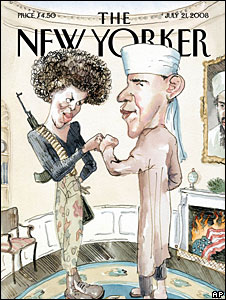 In response to God-o-Meter’s earlier post about debunking the myth that the evangelical voting bloc is a myth (like the Catholic voting bloc, say) Missouri State University religion professor/Immanent Frame blogger John Schmalzbauer—whose post GOM was responding to–commented that evangelical cohesion in the voting booth obscures a rich diversity of evangelical opinions on politics and culture.
In response to God-o-Meter’s earlier post about debunking the myth that the evangelical voting bloc is a myth (like the Catholic voting bloc, say) Missouri State University religion professor/Immanent Frame blogger John Schmalzbauer—whose post GOM was responding to–commented that evangelical cohesion in the voting booth obscures a rich diversity of evangelical opinions on politics and culture.
God-o-Meter thinks that observation is spot on.
Still, polls show that nearly 70-percent of evangelicals support John McCain, a figure that’s in line with evangelical support for previous Republican presidential nominees, despite McCain’s well-documented shortcomings on traditional evangelical issues. It’s another testament to evangelicals’ remarkable political cohesion.
Which leads God-o-Meter to this question: if evangelical support stays where it is on Election Day, despite Obama’s unprecedented evangelical outreach and McCain’s stumbles on all things religion, is it worth it for future Democratic presidential candidates to make a serious play for evangelical votes? Isn’t it a waste of their time?
Schmalzbauer was kind enough to respond at length (God-o-Meter plans to reply shortly):
Dan Gilgoff makes some very good points in his response to my post. At the same time, he underestimates the potential for the Democrats to win over some evangelicals.
Let me begin by saying that 30% for Obama is still a lot of evangelicals, probably 6-10% of the electorate. This is larger than the Jewish vote, the Asian-American vote (which is 6.4% of the population), and nearly as large as the African-American vote. So it makes little sense for Democrats to write off this constituency.
Secondly, there are signs that things are beginning to shift. My original posting for the Immanent Frame cited the Pew survey documenting the drop in Republican partisan identification among evangelicals from 55 percent in 2005 to 40 percent in 2007. This is a trend that bears watching, though it may not bear electoral fruit for several election cycles. Of course, the survey didn’t find a huge increase in evangelical Democrats, just a decrease in Republicans. Still, there are cracks in the Republican base among young evangelicals.
Thirdly, as Dan Gilgoff surely knows, there are lots of ways to measure evangelicalism. Most of the recent surveys rely on a denominational affiliation item, which ignores the evangelicals in mainline denominations. Though these so-called “traditionalist” mainline Protestants may be largely Republican (that’s what the Henry Institute found), this adds a few more million voters to the evangelicals-for-Obama electorate.
Fourth, evangelicals may be open to liberal and Democratic views on certain policy positions. For example, on the Henry Institute survey 52 percent of evangelicals agreed that “Strict rules to protect the environment are necessary even if they cost jobs or result in higher prices,” more than Latino Catholics (47%) or Black Protestants (39%).
Fifth, evangelicals vary widely in their levels of devotion. Both John Green and the Henry Institute folks have distinguished between traditionalist and modernist evangelicals. In the past, Green and Beliefnet’s Steve Waldman have written about the so-called “freestyle evangelicals.” Anyone who has spent some time in the Bible Belt knows that there are plenty of lapsed Baptists and Pentecostals whose politics are more complicated than some of their church-going brethren. Sociologist Arthur E. Farnsley’s ethnography of “flea market believers” found that theologically conservative, non-church going Protestants were “no more likely to vote Republican than Democrat.” Another way to put this question would be, “Is it worth it for the Democrats to go after the Hank Williams, Jr. vote?”
Finally, there are surely evangelical Republicans who, due to temperament and style, are embarrassed by James Dobson’s harsh rhetoric. Michael Lindsay’s Faith in the Halls of Power found that evangelicals in the White House criticized Dobson’s “inability to focus on the family because he’s always focusing on someone else’s business.” This won’t help the Democratic party, but it will lead to a more civil political discourse in America.
Thanks to Dan Gilgoff for raising these questions and for sponsoring one of the more interesting blogs on religion and politics.
8

